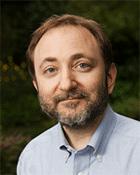Andrew Fire
(1959-)

Andrew Zachary Fire (born April 27, 1959) is a Jewish American biologist at Stanford University who won the 2006 Nobel Prize in Medicine.
Andrew Fire attended the University of California, Berkeley, where he received a Bachelor of Arts in mathematics in 1978 at the age of 19. He then proceeded to the Massachusetts Institute of Technology, where he received a Ph.D. in biology in 1983 under the mentorship of Nobel laureate geneticist Phillip Sharp. From 1986 to 2003, Fire was a staff member of the Carnegie Institution of Washington’s Department of Embryology in Baltimore, Maryland. Fire became an adjunct professor in the Department of Biology at Johns Hopkins University in 1989 and joined the Stanford faculty in 2003.
In 2006, Fire and Craig Mello shared the Nobel Prize in Physiology or Medicine for work first published in 1998 in the journal Nature. Fire and Mello, along with colleagues SiQun Xu, Mary Montgomery, Stephen Kostas, and Sam Driver, reported that tiny snippets of double-stranded RNA (dsRNA) effectively shut down specific genes, driving the destruction of messenger RNA (mRNA) with sequences matching the dsRNA. As a result, the mRNA cannot be translated into protein. Fire and Mello found that dsRNA was much more effective in gene silencing than the previously described method of RNA interference with single-stranded RNA. Because only small numbers of dsRNA molecules were required for the observed effect, Fire and Mello proposed that a catalytic process was involved. This hypothesis was confirmed by subsequent research.
The Nobel Prize citation, issued by Sweden's Karolinska Institute, said: "This year's Nobel Laureates have discovered a fundamental mechanism for controlling the flow of genetic information." "I was very surprised," said Dr. Fire of the early morning phone call from the committee. "At first I thought that maybe they had a wrong number, or that I was dreaming. But I guess it's real."
Sources: Nobel Prize Official Web Site, Wikipedia, Stanford School of Medicine


